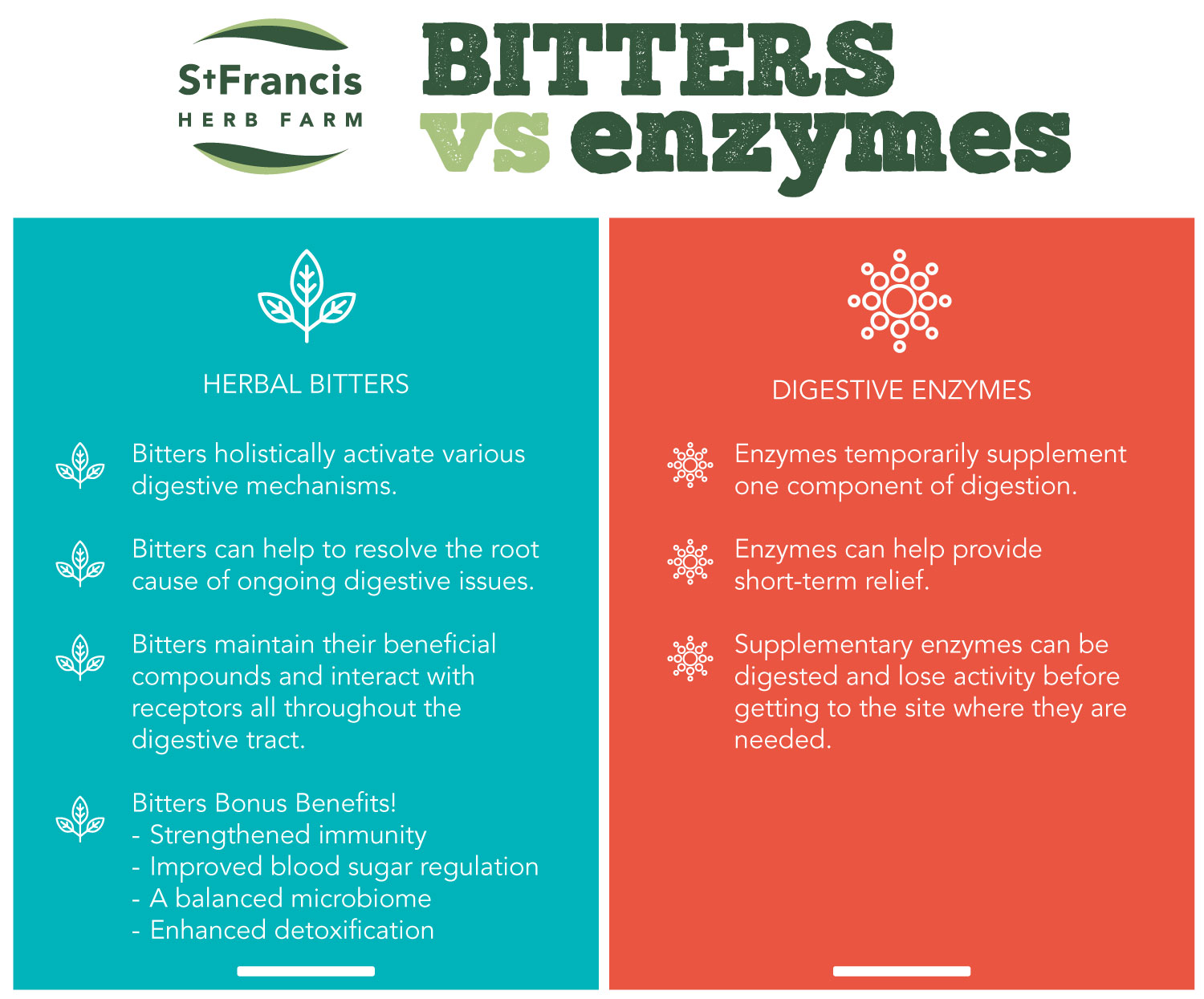There are many digestive support products on the shelf, both over-the-counter pharmaceuticals and natural health supplements. While some are designed to treat only a specific digestive issue or complaint, others are intended to support the body’s own digestive processes.
Two of these are digestive bitters and enzymes.
What are digestive enzymes?
Digestive enzymes are proteins with the role of breaking down food in the body. Your own body produces them, and they are present in saliva, the stomach, the pancreas, gallbladder, liver, and in the intestinal tract. Enzymes also occur naturally in foods you eat, including fresh fruits and vegetables, honey, and fermented foods.
Certain enzymes help to break down different types of food:
- Protease breaks down protein into peptides and amino acids.
- Amylase breaks down carbohydrates into simple sugars
- Lipase breaks down fats into fatty acids
- Alpha-Galactosidase helps break down high-fiber foods like veggies and beans. (You’re likely familiar with Beano®!)
- Cellulase breaks down the tough cell walls of plant foods
Health issues, genetic predisposition, or digestive disturbances can mean that your body is not producing enough enzymes to adequately digest your food. For example, a lactose sensitivity or intolerance can result from a lack of the enzyme lactase, which breaks down the natural milk sugar.
Supplements of digestive enzymes are made from plant, animal, or microbial sources and can contain a single type of enzyme or a blend. These are intended to temporarily supply the body with enzymes to aid in digestion and relieve digestive complaints.
What are digestive bitters?
Bitters are traditional digestive tonics made from a blend of herbs that naturally contain bitter compounds. In a concentrated extract form, these bitter flavours prompt the functioning of the digestive system by stimulating specific receptors on the tongue, causing the “bitter reflex”.
This reflex extends to the vagus nerve, which communicates with the digestive system, kicking it into action. The result is an increase in circulation to digestive organs and signals the release of saliva, gastric juices, enzymes, and bile – secretions that are essential throughout the entire gastrointestinal tract for breaking down food and metabolizing its nutrients.
DID YOU KNOW? Traditionally, bitter foods were included in the diet to stimulate the palate and appetite, but bitter foods are often missing from modern diets! Our palates have become accustomed to eating patterns and agricultural practices that have selectively removed bitter flavours.

Which is better for digestion?
There are 4 main ways bitters and digestive enzymes differ.
Bitters holistically activate the body’s own various digestive mechanisms,whereas enzymes temporarily supplement one component of digestion.
Digestive enzyme supplements perform the role of breaking down the enzymes of certain foods in the meals you eat – but digestion is so much more complex!
Bitters work to stimulate and support many different facets of the digestive process, from the production of saliva and hydrochloric acid to digestive enzymes themselves!
Bitters can help to resolve the root cause of ongoing digestive issues, whereasenzymes can help provide short-term relief.
When you take enzymes with a meal, the enzymes help to break down the food, but do not continue to function after they have helped in the digestion of that food. Bitters, on the other hand, serve to retrain the digestive system, helping it to function more efficiently on-going, instead of merely providing a temporary solution.
There are bitter receptors all throughout the digestive system, whereas supplementary enzymes can be digested and lose activity before getting to the site where they are needed.
Depending on the food and the stage of digestion for which the body lacks sufficient enzymes, supplementary enzymes may or may not get to the required site, whereas bitters aid digestion from the starting point – in the mouth – and maintain their bitter compounds throughout the digestive tract.
The benefits of bitters go further than digestion – there can be positive effects of strengthened immunity, improved blood sugar regulation, a balanced microbiome, and enhanced detoxification!
Need we say more? There’s a reason why bitters herbs have a long history of traditional use in easing gastrointestinal distress, as well as treating other aspects of digestive, metabolic, immune, and all-over health!
Our line of Canadian Bitters® offers a variety of formulas that can be used by the whole family. They combine our signature blend of bitter herbs, including globe artichoke, dandelion, and gentian root, which can be taken daily to help support and strengthen organs of digestion, as they are not habit-forming, like other laxative-heavy bitters formulas.
Learn more about the benefits of bitters: Bitters for Naturally Strong Digestion






